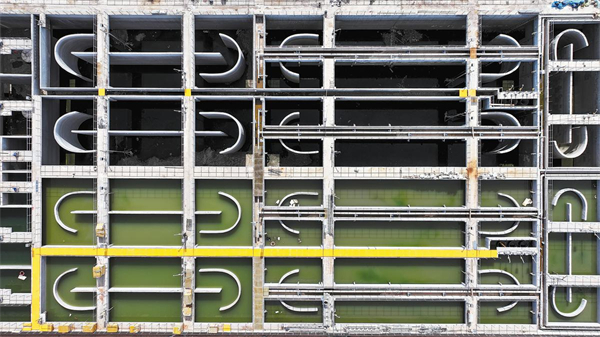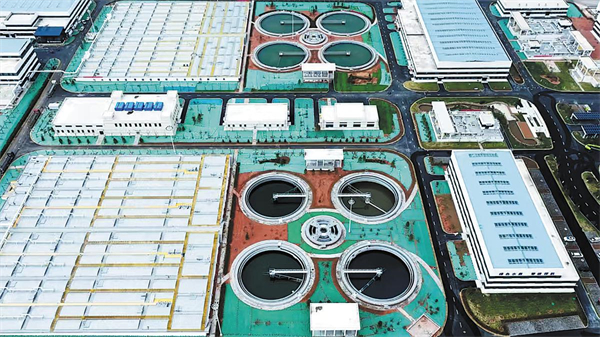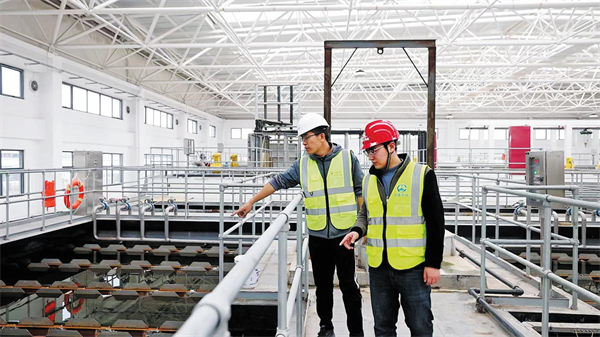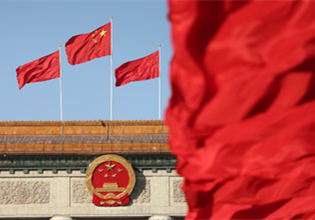Inner Mongolia cuts water use in solar sector
Cities of Ordos, Baotou employ purification projects to push autonomous region to become leader in renewable energy.

An aerial photo shows a state-of-the-art wastewater treatment plant in Ordos, Inner Mongolia autonomous region. Provided to China Daily
A state-of-the-art wastewater treatment plant in Ordos, Inner Mongolia autonomous region, has developed an innovative solution to minimize water consumption in China's rapidly expanding solar panel industry.
While the use of water in making solar panels is not as intense as in some other industries, this wastewater recycling solution further reduces the water footprint of solar panel manufacturing.
After wastewater flows out of the production line for crystalline silicon, which is used for producing photovoltaic solar cells — an essential component of solar panels — at a zero-carbon industrial park of the Mengsu Economic Development Zone, 95 percent of it will return to the production line as high-quality reclaimed water for reuse within only 35 hours.
At present, approximately 50,000 metric tons of wastewater produced in the zone is processed via this water recycling project every day, the total investment of which is over 2.2 billion yuan ($304 million).
Gao Wei, the project's Party chief, said this means only 2,500 tons of fresh water is needed daily to meet production needs.
As China advances toward its climate goals of peaking carbon dioxide emissions before 2030 and achieving carbon neutrality before 2060, the country's solar panel production has been continuously ramping up to meet the growing demand for solar energy. China's solar power capacity reached approximately 886 million kilowatts last year, reflecting a year-on-year increase of 45 percent, according to the National Energy Administration.
The zero-carbon industrial park serves as a prime example of China's efforts to enhance the use of reclaimed water in its rapidly growing solar panel industry, a step toward making the sector more sustainable.
Gao said the 5 percent of the water not reused in the production line undergoes a specialized treatment process through an evaporation and crystallization system. This means that there is no discharge of wastewater at all.
"This zero-emission model sets a precedent in the field of photovoltaic wastewater treatment in China," he said. "Conversely, concentrated water treatment in traditional sewage plants often faces challenges in achieving zero emissions, usually necessitating dilution or additional wastewater treatment to meet emission regulations."
The salts separated in the evaporation and crystallization system, such as sodium chloride and sodium sulfate, are utilized as resources, he said, adding the sodium chloride, for example, can be used for producing snow-melting agents.
"This method of resource utilization not only decreases waste emissions, but also creates extra economic value," he said.
Gao said the project's wastewater processing technique is designed to address a critical challenge in the solar panel industry — the high salt and hardness levels in wastewater, along with difficult-to-degrade organic matter.
The facility uses highly efficient silica and a hardness removal pretreatment process, he noted.
He said it also employs multiple technologies to treat challenging pollutants in wastewater from crystalline silicon production, including high levels of dissolved solids and chlorides.
These measures ensure that the reclaimed water meets requirements for the ultrapure water needed for photovoltaic manufacturing.

The plant treats 50,000 metric tons of wastewater from a zero-carbon industrial park of the Mengsu Economic Development Zone in Ordos every day. Provided to China Daily
Ordos authorities have vowed to further tap the potential of reclaimed water in meeting demand from its booming solar industry, especially because the city is located in an arid area with scarce water resources in the Yellow River Basin.
The per capita water resources in Ordos is only 1,287 cubic meters, compared to the national average level of 2,100 cubic meters. While the city's annual precipitation ranges from 150 to 350 millimeters, the city's evaporation levels stand between 2,000 and 3,000 millimeters.
Despite this, the city has 30 solar panel manufacturers and supporting enterprises, covering the entire industrial chain, according to a statement from the department of industry and information technology in Ordos in response to inquiries from China Daily.
While the output of polycrystalline silicon in the city decreased by 43 percent year-on-year in 2024, the city registered significant increases in the production of monocrystalline silicon and many other materials and components for solar energy development, the statement said.
Output of monocrystalline silicon reached 48,700 tons last year, a 431 percent increase on the year prior. The production of silicon wafers in the city, for instance, surged by 503 percent to 3.8 billion slices, while the manufacturing of solar cells saw a significant spike of 1,825 percent to 23.3 gigawatts.
Silicon wafers are the most commonly used semiconductors in solar panels. Positive-type and negative-type wafers are combined in a solar cell to convert sunlight into electricity through the photovoltaic effect.
The production of wafers is a crucial step in panel manufacturing that requires water consumption. Water is essential for cooling and lubricating the cutting tools, as well as for cleaning the wafers. Usually, producing one regular silicon wafer requires approximately 500 milliliters of water, equivalent to a regular bottle of water.
Ordos has effectively addressed the constraints of water resources on its photovoltaic sector by utilizing reclaimed water, drainage and mine well water, as highlighted by the city's Department of Water Resources.
There are 25 operational wastewater treatment plants in the city, primarily situated in urban areas and industrial parks, with a daily processing capacity of 520,000 cubic meters. Ordos has also completed the construction of four projects for storing reclaimed water to enhance its utilization.
Almost 91 percent of the reclaimed water generated in the city was collected and utilized last year, the department reported. It emphasized that the city will continue its efforts to leverage these unconventional water sources to meet the water demand of its crystalline silicon industry.

Workers check equipment at the plant. Provided to China Daily
In Baotou, which produces 40 percent of the country's monocrystalline silicon and polycrystalline silicon, and is striving to build a global green silicon city, the local government has also intensified efforts to utilize reclaimed water to meet the demand of manufacturers.
The output of polycrystalline silicon in Baotou increased by 94.7 percent year-on-year in 2024 to 753,000 tons, and the production of monocrystalline silicon soared by 94.4 percent to 558,000 tons, according to Zhang Pengfei, an official with Baotou's development and reform commission.
In addition to constructing three new industrial wastewater treatment and reclaimed water purification projects, one wastewater treatment plant underwent an upgrade to meet higher standards, according to the commission. The efforts increased the city's daily capacity to provide highly purified reclaimed water by 163,500 cubic meters, meeting the water consumption demand of five crystalline silicon companies.
By the end of last year, a new wastewater treatment plant was put into use at Baotou Equipment Manufacturing Industrial Park.
The 850-million-yuan plant can produce 90,000 cubic meters of high-quality reclaimed water daily, said Feng Jianxi, an executive at Baotou Water Resources Group, the operator of the facility.
"The center excels in treating both domestic sewage and complex industrial wastewater, producing outstanding treatment outcomes. This enables the reclaimed water to meet the high-quality demand of crystalline silicon manufacturers in the industrial park," he said.
The project is a microcosm of Baotou's efforts to tap the potential of reclaimed water in supporting its huge crystalline silicon sector and other industries, according to a statement from Baotou's development and reform commission.
"In recent years, Baotou has launched 16 projects as part of a national pilot initiative for building demonstration cities for utilizing reclaimed water, with a total investment exceeding 4.1 billion yuan... All the projects will be completed and put into use this year, increasing the city's annual capacity to allocate and utilize reclaimed water by 70 million cubic meters.
"These facilities will aid in the establishment of a reclaimed water utilization system in Baotou, incorporating small-scale subsystems within enterprises, medium-sized systems in industrial parks, and an overarching system spanning the city," the statement said.



 Print
Print Mail
Mail





